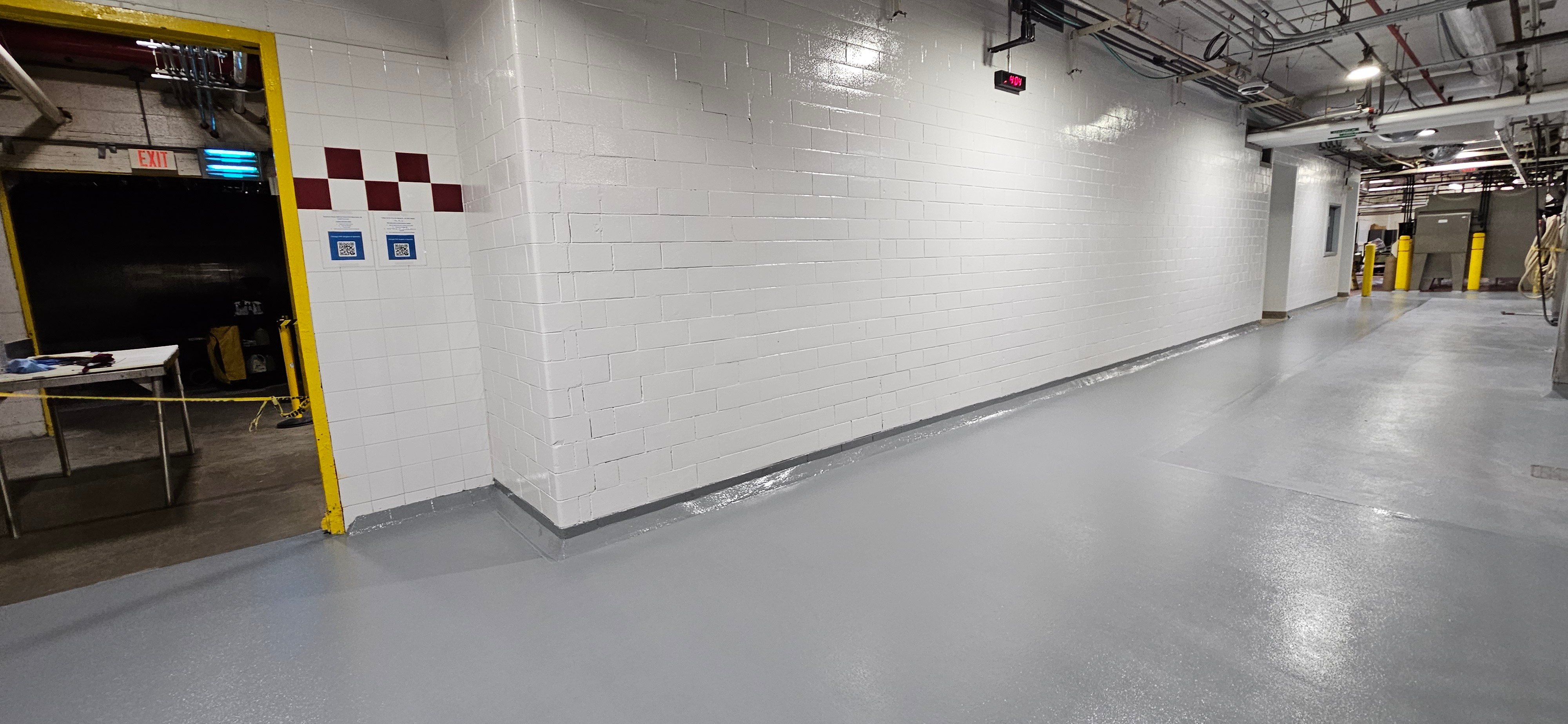Epoxy vs. Polished Concrete: Which Works Best for Racine Businesses?
November 26th, 2025
3 min read
By Tom Dassie

For Racine business owners, flooring is more than a finishing touch—it’s a foundation for daily operations. Whether you manage a warehouse, retail space, or production facility, your floor must handle heavy traffic, resist wear, and maintain a professional appearance. Two of the most popular options for commercial spaces are epoxy coatings and polished concrete.
Both offer impressive durability and aesthetic appeal, but they differ in performance, maintenance, and cost. Understanding these distinctions can help you select the best concrete coating for your facility’s needs and budget.
At CustomCrete, we’ve installed both systems throughout Racine and southeastern Wisconsin, giving local businesses solutions built for long-term use in tough environments.
Why Flooring Choice Matters for Racine Businesses
Racine’s mix of manufacturing, warehousing, and commercial properties means floors must do more than look good—they need to perform. Temperature shifts from Wisconsin winters, chemical exposure, and heavy equipment all impact how well your flooring holds up over time.
Epoxy and polished concrete are two systems designed to strengthen concrete surfaces and extend their lifespan. The right choice depends on your facility’s day-to-day conditions and what you expect from your floor over the long term.
Epoxy Coatings: Seamless Protection and Customization
Epoxy is a resin-based concrete coating that bonds to the slab to form a hard, protective surface. It’s known for its seamless finish, chemical resistance, and wide range of design options.
Advantages of Epoxy Flooring:
- Durability: Handles impact from forklifts, machinery, and constant traffic without cracking or peeling.
- Chemical Resistance: Ideal for facilities dealing with oils, solvents, or cleaning agents.
- Easy to Clean: Non-porous surface resists stains and bacteria buildup, supporting hygiene.
- Customizable Appearance: Available in solid colors, metallic designs, or textured finishes for slip resistance and branding.
Considerations for Epoxy:
Epoxy performs best when installed on properly prepared concrete. Moisture levels and temperature during installation can affect adhesion, so professional assessment is essential. Over time, epoxy may require reapplication or a new topcoat in heavy-use environments.
Best for:
- Manufacturing plants
- Warehouses
- Auto shops and dealerships
- Food and beverage facilities
Polished Concrete: Sleek, Sustainable, and Low-Maintenance
Polished concrete isn’t a coating—it’s achieved by mechanically grinding, densifying, and polishing the existing slab. The result is a smooth, reflective finish that’s both durable and visually appealing.
Advantages of Polished Concrete:
- Low Maintenance: No coatings or waxing needed; regular cleaning keeps it looking like new.
- Long Lifespan: Extremely durable under heavy foot or equipment traffic.
- Energy Efficiency: Reflective surface improves lighting, reducing energy use.
- Eco-Friendly: Uses the existing concrete slab, producing minimal waste and no VOCs.
Considerations for Polished Concrete:
Polished concrete offers less chemical resistance than epoxy. It’s also not ideal for areas with standing water, heavy chemical use, or extreme temperature changes.
Best for:
- Retail spaces
- Offices and showrooms
- Educational or municipal buildings
- Light manufacturing
Side-by-Side Comparison: Epoxy vs. Polished Concrete

Epoxy’s protective surface makes it ideal for industrial spaces that face frequent chemical or mechanical wear. Polished concrete, on the other hand, shines in clean, professional environments where low maintenance and aesthetics are priorities.
Choosing the Right System for Your Racine Facility
When deciding between epoxy and polished concrete, consider:
- Your Environment: Is the space exposed to moisture, chemicals, or temperature swings?
- Maintenance Goals: Do you prefer a low-maintenance floor or one that can be easily recoated when needed?
- Appearance: Do you want a decorative, colorful floor or a modern, minimalist finish?
In many Racine facilities, epoxy coatings are used in production or warehouse areas, while polished concrete is ideal for front-of-house spaces or offices. Combining both can give your business the best of function and design.
FAQ: Epoxy vs. Polished Concrete
- Which floor lasts longer—epoxy or polished concrete?
Polished concrete generally lasts longer with less maintenance, but epoxy offers stronger protection against chemicals and impacts. - Can either flooring option be installed over old concrete?
Yes, but the slab must be properly prepared. Grinding, patching, or moisture testing may be required before installation. - Which option is better for wet environments?
Epoxy is typically the better choice for moisture-prone areas, as it forms a non-porous barrier that prevents water intrusion.
Final Thoughts
Both epoxy and polished concrete are durable, long-term flooring investments for Racine businesses. The right choice depends on your environment, design goals, and maintenance preferences.
Whether you need a concrete coating that resists chemicals or a polished surface that enhances aesthetics, professional installation ensures optimal performance and lifespan.
✅ Next Step: To find the best flooring solution for your Racine facility based on your budget, read our next article “Concrete Coating Pricing in Racine: Factors That Impact Your Investment”.
Topics:












.jpg?width=7008&height=4672&name=CC101560%20(1).jpg)











